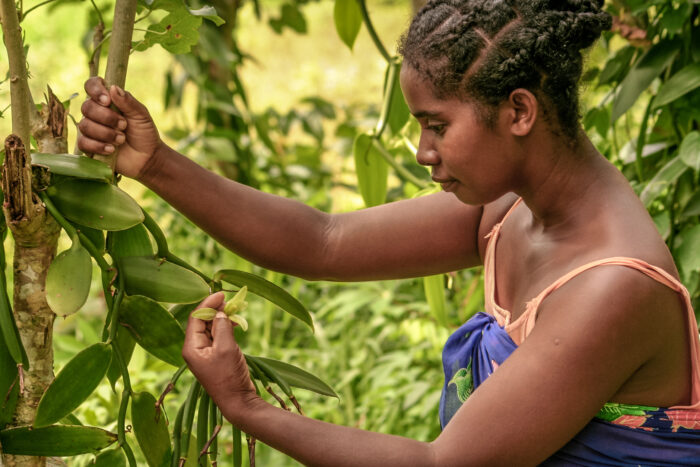
Building sustainable food systems is more than increasing agricultural productivity and building up agriculture value chains. Even if food availability increases, that does not guarantee food is equally accessible to women, youth, and social minorities, or that it increases the health and well-being of those consuming it. Regardless of what point in the value chain you may be working on, taking both with an inclusive and nutrition-sensitive lens is crucial to achieving those outcomes. Taking an inclusive and nutrition-sensitive approach does not mean all projects should do traditional nutrition trainings or add-on gender activities, but rather that development organizations working on food systems need to take a systems approach to nutrition and inclusion. Cooperatives already play a powerful role in the food system and are an important entry points for a holistic approach to creating inclusive and nutritious food systems.
Strengthening cooperatives and producer organizations is at the core of NCBA CLUSA’s work in applying the seven cooperative principles to promote cooperative business development. Under USAID Cooperative Development Program (CDP), NCBA CLUSA leads the Creating an Environment for Cooperative Expansion (CECE) project in Kenya, Tanzania, Guatemala, Peru, and Madagascar. While the overall goal of the project is to support cooperatives and their enabling environment, NCBA CLUSA knows that cooperatives play a key role in improving gender equity and nutrition. For example, in Kenya, NCBA CLUSA promoted women’s leadership and participation in dairy cooperatives, as well as creating income-generating avenues along this nutritious value chain. Increasing women’s leadership and income-generation can have a ripple effect on promoting household income and nutrition, all while making a crucial nutritious product, dairy, more available in communities. For example, some dairy cooperatives operate their own convenience stores, allowing women to buy food products and other goods on credit when needed, and later deduct this value from the pay they receive for milk delivery to the co-op. This service supports women members’ needs and incentivizes women to deliver more milk to the co-op.
In Madagascar, NCBA CLUSA has used the cooperative principles to guide our work on the USAID Sustainable Vanilla for People and Nature (SVPN) Activity, locally known as Mafatoky. Mafatoky’s goals are to create sustainable certified vanilla production that is environmentally friendly. While the project is focused on creating partnerships with vanilla producers and local commercial partners to sell vanilla in the international market, Mafatoky simultaneously promotes women’s participation and leadership in cooperatives, and adapts project interventions to their specific needs. For example, Mafatoky trained women on poultry raising, providing them with an additional income-generating activity outside of the vanilla cooperatives. This ensures that women, regardless of the time of year, earn income to improve their own access to nutritious foods. In FY22, 1,700 chicks were distributed to trained cooperative members who were actively raising chickens and built improved chicken coops, ultimately increasing the availability of poultry more broadly in the community.
Alongside cooperative development, NCBA CLUSA developed and implements a Nutrition-Led Agriculture approachin resilience programs. This approach places nutrition and the production of nutritious foods at the center of agriculture productivity. While NCBA CLUSA has used this approach in many contexts, most recently it had significant successes as a part of the USAID Senegal Feed the Future Kawolor project. In addition to this strong focus on nutrition via production of nutritious foods and nutrition education, Kawolor also formed more than 5,000 women’s groups across the country. These groups participated in a variety of trainings around nutrition and microgardening, as well as Village Savings and Loans Associations (VSLAs) aimed to increase women’s access to finance. However, Kawolor did not stop there. Understanding that providing access to finance does not guarantee women’s decision-making over that credit or income, Kawolor also implemented gender transformative activities to address the underlying barriers that hinder women’s empowerment. These activities included implementing Helen Keller International’s Nurturing Connections curriculum as well as a male gender champions strategy, both of which led to positive impacts on women’s empowerment. As a result of this combination of activities, over the course of the project, women consuming an adequately diverse diet increased from 19.7% to 96.2%.
Across all projects, NCBA CLUSA takes a strong inclusive and nutrition-sensitive lens to ensure impactful and sustainable outcomes. To learn more about our work, click here.


